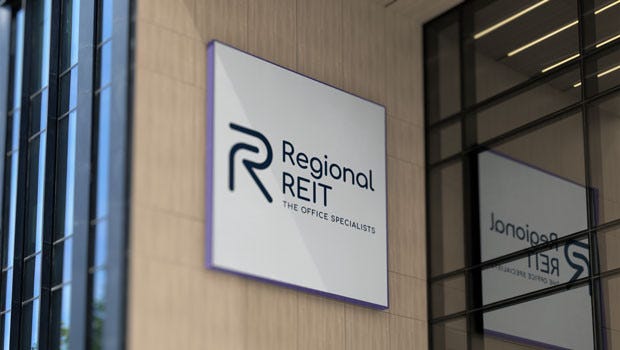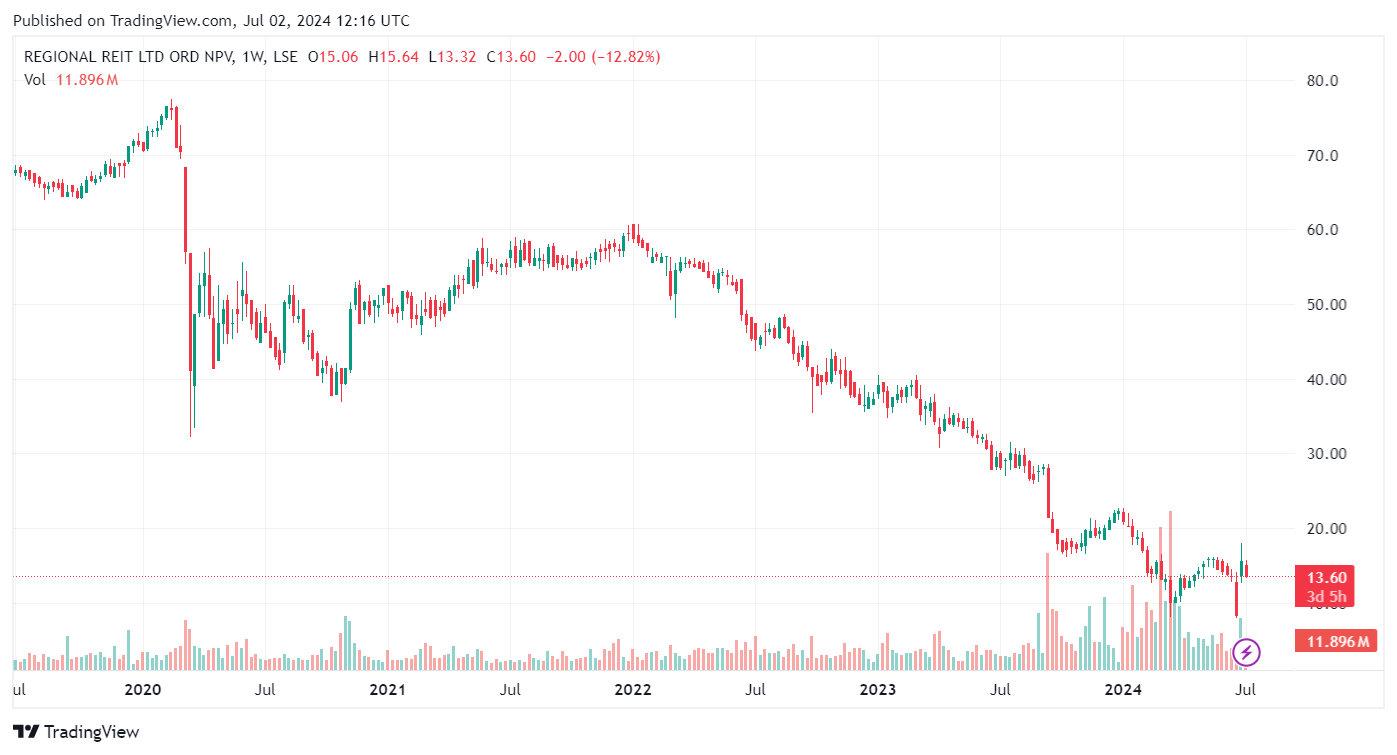Regional REIT (LON: RGL) Share price crash!
The RNS that caused another CRASH - Navigating Regional REIT's Bold Capital Raising.
Dear readers,
This week, I thought it would be interesting to dive into Regional REIT, which has recently announced significant news regarding its capital raising efforts. This is a crucial time for investors who need to decide whether to buy more shares or face dilution.
Understanding a Rights Issue - A rights issue is a method by which a company raises additional capital by offering existing shareholders the right to purchase additional shares at a discounted price, typically in proportion to their existing holdings. This allows shareholders to maintain their ownership percentage in the company while providing the company with much-needed funds.
Below, we will delve into the details of the RNS and what it means for investors in the company. We will also explore this as an opportunity to buy shares in the company at very low valuations.
*RGL Share Price 5yr
Introduction: A Transformative Move
Regional REIT Limited (LSE: RGL), a prominent player in regional property investment, has embarked on a significant capital-raising initiative. This bold step aims to secure approximately £110.5 million through a fully underwritten Placing, Overseas Placing, and Open Offer of 1,105,149,821 New Ordinary Shares at an issue price of 10 pence per share. This article delves into the intricate details of this capital-raising effort, the subsequent share consolidation, and the potential risks and rewards for retail investors.
I have split the RNS into two parts. The first part examines the rights issue, and the second part addresses the share consolidation.
Part 1
The Capital Raising:
Amount Raised: £110.5 million
Issue Price: 10 pence per share
Underwriting:Fully underwritten by Bridgemere Investments Limited, part of the Bridgemere group of Companies established by Steve Morgan CBE.
Share Allocation: 15 New Ordinary Shares for every 7 Existing Ordinary Shares
Net Proceeds: Approximately £104.7 million after expenses
Allocation of Funds:
Retail Bond Redemption: £50 million will be used to redeem the 4.5% Retail Bond maturing on August 6, 2024.
Reduction of Bank Facilities: £26.3 million will reduce bank facilities, creating greater financial flexibility.
Capital Expenditure: £28.4 million will be allocated for selective capital expenditures to enhance near-term earnings and long-term value.
Debt Reduction and Financial Flexibility:
Debt Profile Improvement: The capital raising will lower the Loan-to-Value (LTV) ratio from 56.8% to 40.6%.
Financial Headroom: Reducing bank facilities and eliminating the Retail Bond will provide the company with greater headroom under existing covenants, enhancing liquidity.
Dividend Stability:
Dividend Assurance: The company aims to maintain quarterly dividends, with an expected payout of approximately 2.2 pence per Ordinary Share following share consolidation.
Asset Management and Valuation:
Portfolio Valuation: The company’s properties were valued at £647.8 million as of June 21, 2024.
Asset Disposals: An ongoing asset disposal program has already generated £21.9 million from 13 disposals and 3 part sales.
Part 2:
Share Consolidation:
Following the capital raising, Regional REIT plans a 1 for 10 share consolidation to boost market liquidity and stabilize share prices. This move aims to attract a broader range of institutional and public investors by making the shares more appealing and less volatile.
Impact on Shareholders:
Fractional Entitlements: Shareholders with holdings not divisible by 10 will see their shares rounded down, potentially leading to a minimal loss of shares.
Market Dynamics: The consolidation is expected to increase market liquidity and reduce price volatility, potentially making the shares more attractive to larger investors.
Other News
Board Reshuffle:
Resignations: Chairman Kevin McGrath and Non-Executive Director Dan Taylor will step down following the next AGM, marking a significant shift in the company’s governance.
Bridgemere’s Influence: Bridgemere, as a major underwriter, will gain the right to appoint a director, influencing strategic decisions.
Risks and Rewards for Retail Investors
Rewards:
Enhanced Dividend Prospects: The strategic use of capital to reduce debt and fund asset improvements is likely to stabilize and potentially increase dividend payouts.
Improved Financial Health: Reduced indebtedness and increased financial flexibility position the company for growth and stability.
Market Positioning: The share consolidation could enhance the share's appeal to a broader investor base, potentially driving up share prices.
Risks:
Market Volatility: Despite efforts to stabilize the share price, market conditions and economic factors could still lead to volatility.
Operational Challenges: The post-pandemic environment and evolving office space demand may continue to impact the company’s operations and asset valuations.
Governance Changes: The departure of key board members and new appointments could lead to shifts in company strategy and management practices.
Conclusion:
This is a key pivotal moment for shareholders and the company. In the long term, this can be viewed in a positive light as it allows the company to lower its debt, thus becoming more financially stable and helping with better strategic growth.
For retail investors, this is a time for them to dig deep into their pockets as they need to pay for the right to buy new shares or face dilution. In the long term, this could again be beneficial for shareholders, but it is dependent on how the company can grow and keep lowering its debt. I think with new board changes, we could see the company improve and look towards more growth. However, only time will tell.
Thanks for reading, let me know your thoughts on Regional REIT and the RNS.
OLLZ






